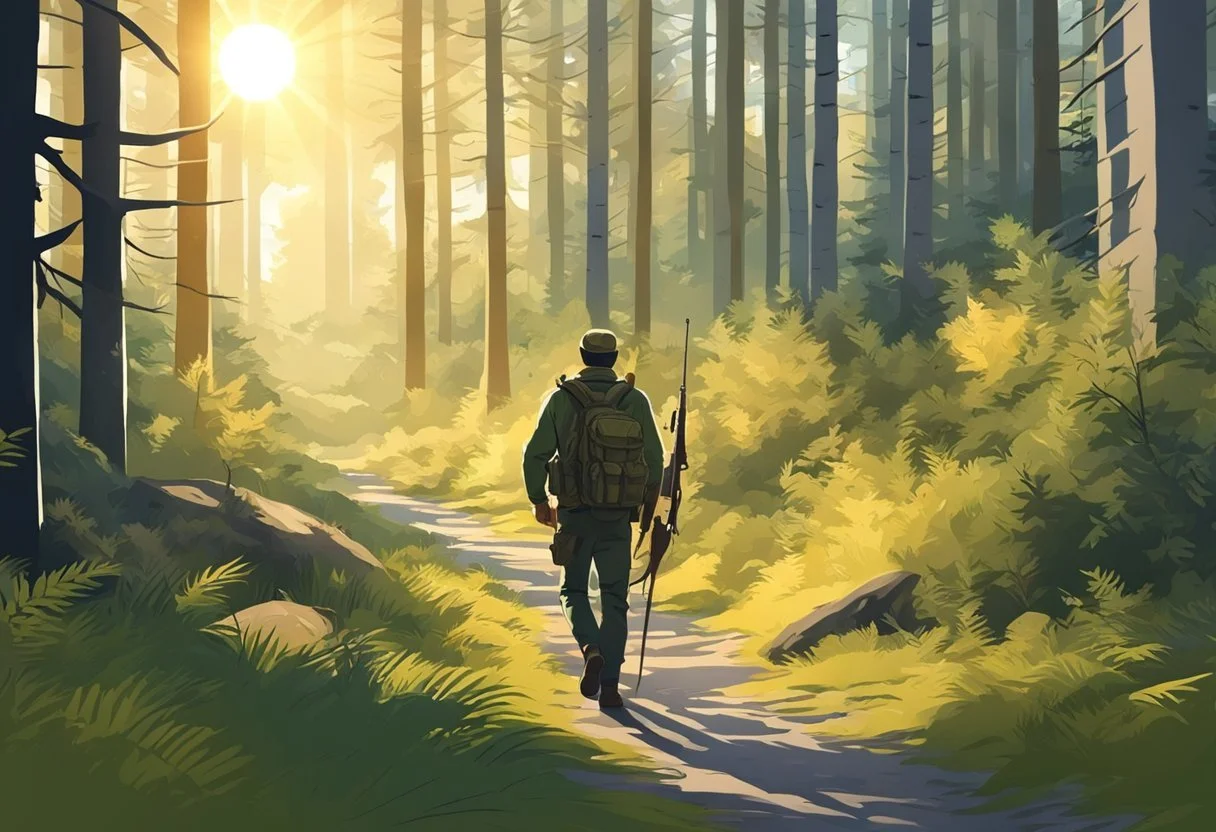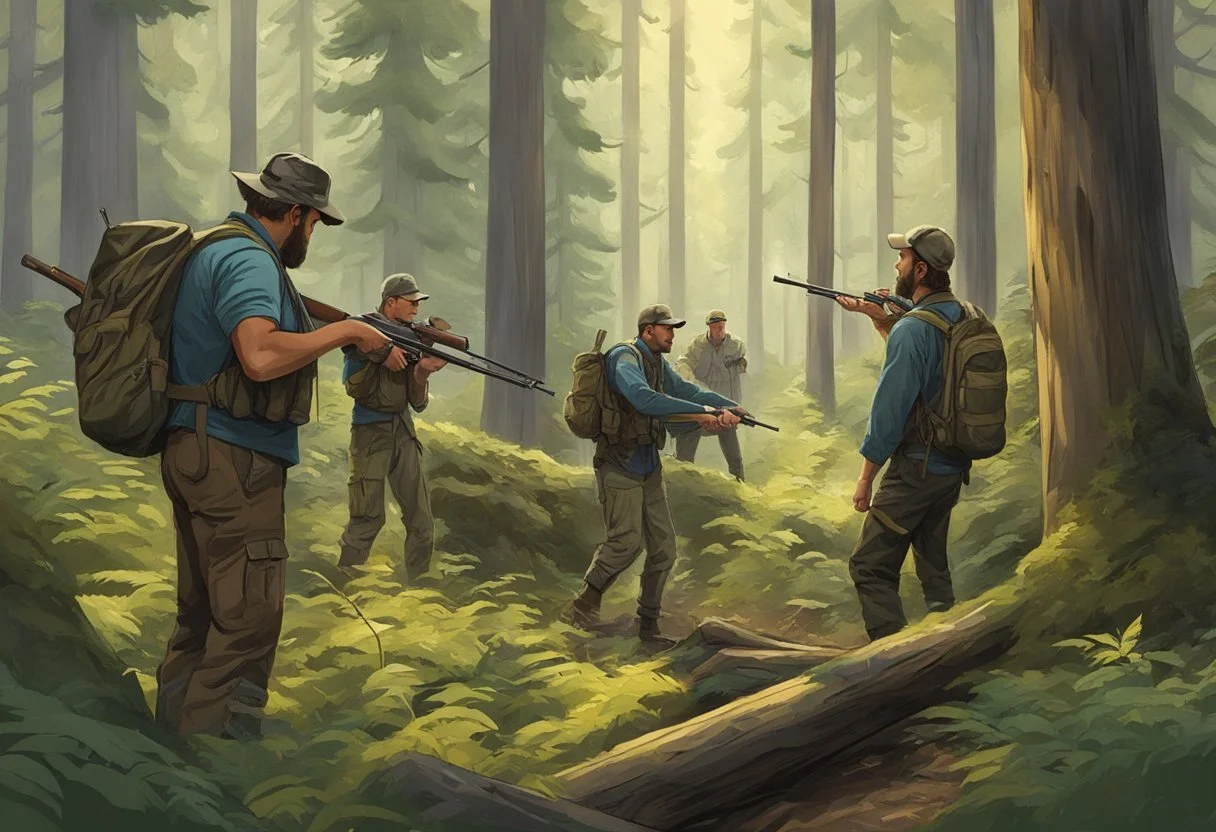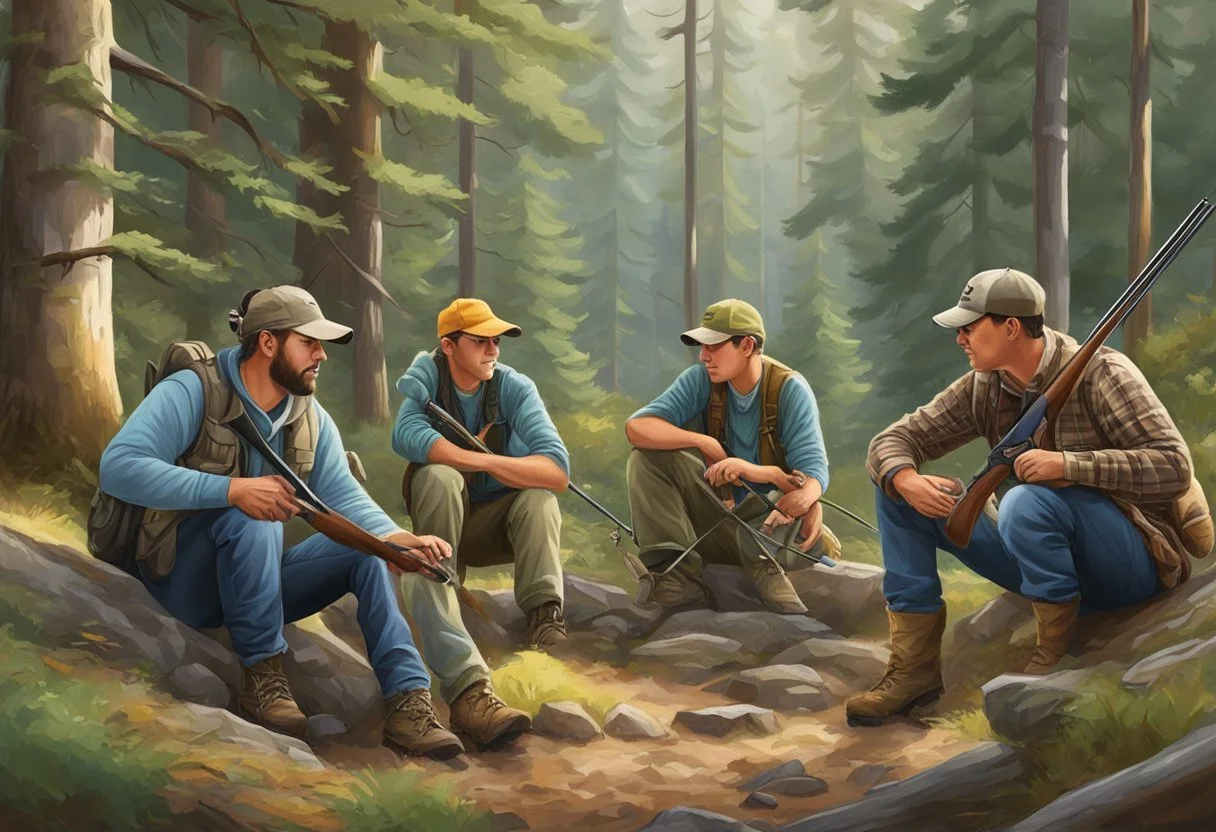Your Guide to Hunting in Washington
Essential Tips and Regulations
This Article is Part of Our Hunting Guide for All 50 US-States
Hunting in Washington State offers a variety of opportunities for beginners to experience the thrill of the chase and connect with nature. With diverse habitats ranging from coastal rainforests to high desert plateaus, the state provides a rich environment for many species of game animals, such as deer, elk, waterfowl, and upland game birds. This article aims to guide novice hunters through the essential aspects of hunting in Washington, including licensing requirements, regulations, and helpful tips for a successful experience.
Before venturing out into the wilderness, it is crucial for beginners to familiarize themselves with the state's hunting laws and regulations. The Washington Department of Fish and Wildlife (WDFW) manages and enforces these rules to ensure sustainable hunting practices and maintain healthy wildlife populations. New hunters should explore the WDFW website and obtain the necessary licenses and permits, as well as review the hunting season dates, bag limits, and any local restrictions.
With a basic understanding of Washington's hunting regulations, the next step for beginners is to acquire the appropriate gear and develop essential skills. This process entails investing in quality clothing, firearms or bows, and additional equipment to maximize comfort and success in the field. Furthermore, novice hunters should consider taking a hunter education course, which covers vital topics like firearm safety, basic hunting techniques, and ethical hunting practices. By arming themselves with the proper knowledge and tools, beginners will be well on their way to becoming skillful and responsible hunters in Washington.
Understanding Hunting in Washington
Essentials of Hunting License and Regulations
In Washington State, hunters need a valid hunting license from the Washington Department of Fish and Wildlife (WDFW) before going on a hunt. Licenses vary depending on the species, age of the hunter, and residency status. To obtain a hunting license, individuals must complete a hunter education course.
Hunting seasons are regulated and managed by the WDFW. Some key factors to keep in mind include:
Season dates: vary depending on the species and hunting method.
Bag limits: the maximum number of animals a hunter can harvest.
Weapon restrictions: specific firearms or bows allowed for hunting various species.
It is crucial for hunters to always follow the guidelines provided in the Washington Hunting Regulations guide to stay compliant and ensure sustainable hunting practices.
Washington Wildlife and Game Management
The WDFW manages diverse wildlife populations by creating and implementing game management plans. The goal is to maintain healthy ecosystems, control animal populations, and prevent overhunting. Some popular game species in Washington include:
Big Game: Deer, Elk, Bear, and Cougar.
Upland Birds: Pheasant, Quail, and Wild Turkey.
Each species has a designated hunting season and specific regulations to ensure effective wildlife management. Proper wildlife management helps maintain a delicate balance between the needs of both wildlife and the local community.
Conservation Efforts and Hunter Responsibility
Part of being an ethical hunter is understanding and participating in conservation efforts. In Washington, the WDFW works alongside hunters to achieve sustainable wildlife populations. Some of the hunters' responsibilities include:
Abiding by all laws and regulations set by the WDFW.
Practicing fair chase principles and respecting the animals.
Avoiding the waste of game meat.
Reporting any observed violations of hunting laws.
Hunters also contribute to ongoing conservation efforts through fees paid for hunting licenses and equipment. These funds support the WDFW in managing and conserving Washington's wildlife populations and habitats. The role of hunters is here crucial, as their actions directly impact the health of ecosystems and the sport they love.
Getting Started with Hunting
Hunter Education and Safety Courses
Before heading out on your first hunting adventure in Washington, you must complete a hunter education course. This mandatory training ensures that all hunters have a strong foundation in safety, ethics, and conservation. The hunter education program consists of a combination of classroom lessons and hands-on, practical instruction in firearms field skills.
There are a variety of options for completing your hunter education training:
Traditional in-person classes offered by certified instructors
Online courses followed by an instructor-led field skills evaluation
Regardless of which method you choose, all hunter education classes cover the following topics:
Knowledge of firearms and archery equipment
Safe handling and storage of firearms
Laws and regulations governing hunting
Ethical hunting practices
Wildlife management and conservation
To find a course near you, visit the Washington Department of Fish and Wildlife website.
Choosing the Right Equipment and Ammunition
To ensure a successful and safe hunting experience, it's essential to use the appropriate equipment and ammunition for your chosen game species.
When selecting a firearm or bow, consider the following factors:
Recoil: Choose a weapon with manageable recoil to ensure proper control and accuracy.
Weight: A lighter firearm or bow will be more comfortable to carry during long hunts.
Accuracy: Ensure your weapon is properly sighted in and accurate enough for your intended quarry.
Using the correct ammunition is also crucial to ensure both performance and safety. The following table outlines commonly used cartridges and their appropriate game:
Game Species Suggested Calibers or Ammunition Small Game .22 LR, .22 WMR, .17 HMR Upland Game Birds 12, 20, or 28 gauge shotshell Waterfowl Steel or non-toxic shot Medium Game (deer) .243 Winchester, .270, .308 Large Game (elk) .300 Win Mag, .30-06, 7mm Mag
This table is not exhaustive but provides a general guideline for selecting the right ammunition. Always consult local regulations for any ammunition restrictions or requirements. And, of course, practice at the range with your chosen firearm and ammunition to build the skills and confidence necessary for a safe and successful hunt.
Hunting Opportunities in Washington
Types of Game and Seasons
Washington state offers a variety of hunting opportunities for both beginners and experienced hunters. The diverse landscape and abundance of game make it an attractive destination for hunting enthusiasts. Some of the most popular big game species include deer, elk, black bear, cougar, and mountain goat. Small game, such as bobcat and other upland bird species, are also popular targets for hunters.
The hunting seasons for these species vary, with specific dates and requirements set by the Washington Department of Fish and Wildlife. It's essential to consult the official regulations for the current year's hunting seasons and legal requirements.
Special Hunt Permits and Raffle Hunts
For certain game species, Washington state offers special hunt permits that allow hunters additional hunting opportunities beyond the general seasons. These permits are typically issued through a drawing and can provide access to restricted areas with higher-quality hunting experiences.
In addition to special hunt permits, the state also offers raffle permit hunts. Raffle hunts provide hunters the chance to win exclusive hunting opportunities for premier species such as deer, elk, and mountain goat. The proceeds from raffle ticket sales contribute to wildlife conservation efforts within the state.
Waterfowl and Upland Bird Hunting
Waterfowl hunting is a popular activity in Washington, with diverse wetland habitats attracting numerous migratory bird species. Hunting opportunities for waterfowl abound throughout the state, from river deltas to shallow lakes and marshes.
Washington is also known for its upland bird hunting opportunities, with diverse species such as pheasant, quail, and chukar partridge available for harvest. As with waterfowl, the season and bag limits for upland bird hunting vary by species and location, so checking the state's official hunting regulations is crucial before embarking on a hunt.
With a wide range of game species, diverse habitats, and unique hunting opportunities, Washington state offers something for every hunter to enjoy. Proper research, preparation, and adherence to state regulations will ensure a safe and rewarding experience in the beautiful Pacific Northwest.
Where to Hunt: Public Lands and Private Property
Accessing Lands in Eastern and Western Washington
In Eastern Washington, there are vast areas of public lands available for hunters to explore. Bureau of Land Management (BLM) lands, Washington Department of Fish and Wildlife (WDFW) lands, and U.S. Forest Service lands offer numerous hunting opportunities. Popular locations in Eastern Washington include the Colville National Forest and the Wenatchee National Forest, which are home to wildlife such as deer, elk, and black bear.
In Western Washington, hunting is more limited due to the heavily forested and mountainous terrain. However, some public lands are still available for hunting, primarily within the Olympic National Forest and the Mount Baker-Snoqualmie National Forest. Species such as black-tailed deer, elk, black bear, and cougar can be found in these regions.
Private property hunting opportunities are also available in both Eastern and Western Washington. Always remember to ask for permission from the landowner and obtain any necessary permits before hunting on private land.
National Hunting and Fishing Day Events
National Hunting and Fishing Day is a nationwide event celebrated annually on the fourth Saturday of September. In Washington, this event serves as an excellent opportunity for beginners to learn about hunting and fishing opportunities, responsible practices, and conservation efforts.
In Southwest Washington, the WDFW and local sporting organizations often collaborate to host events and workshops coinciding with National Hunting and Fishing Day. Examples of activities offered at these events can include:
Hands-on tutorials on hunting and fishing techniques
Wildlife identification workshops
Information on public lands and access
Youth events and activities
By participating in National Hunting and Fishing Day events, beginners can not only gain valuable knowledge about hunting in Washington, but also join in fostering conservation and appreciation for the state's natural resources.
Legal Considerations and Ethics
When venturing into the world of hunting in Washington, there are various legal considerations and ethical guidelines to keep in mind. In this section, we will focus on understanding bag limits and reporting requirements, as well as navigating special regulations and exceptions.
Understanding Bag Limits and Reporting Requirements
It is crucial for beginner hunters to become familiar with bag limits and reporting requirements in Washington State. Bag limits refer to the maximum number of animals a hunter is allowed to harvest during a specified period. Various game species have different bag limits, and these may vary depending on the hunting method used.
Washington State requires hunters to submit a hunter report at the end of each hunting season. This report provides crucial data that helps wildlife managers to set future hunting seasons and quotas. Failing to submit a hunter report can lead to a suspension of your hunting privileges.
Here is a brief breakdown of some reporting requirements:
Big game: Must complete a hunter report within 10 days of harvest or, for unsuccessful hunters, within 10 days of the season's end.
Upland birds: Submit a hunter report before the prescribed deadline.
Trapping and falconry: Hunters must report trapping and falconry activities as mandated by the Washington Department of Fish and Wildlife (WDFW).
Navigating Special Regulations and Exceptions
In Washington State, there are numerous special regulations and exceptions that beginner hunters must consider. Some of these include:
Bear identification program: Before hunting bear, hunters must complete an online Bear Identification Test provided by the WDFW.
Military exemptions: Active-duty military personnel who are stationed in Washington may be eligible for reduced fees and special hunting opportunities. Check the WDFW website for more information on these exemptions.
Special permit draw: Certain hunts require special permits, obtained through a lottery draw system. The WDFW website provides detailed information on the application process and deadlines for various special permit hunts.
Trapping and falconry: These unique hunting methods have their own specific regulations, and prospective hunters must obtain the necessary permits and follow established guidelines.
By familiarizing yourself with these legal considerations and ethical guidelines, you can ensure a responsible and enjoyable hunting experience in Washington State. Always remember to check the latest regulations and updates on the WDFW website before embarking on any hunting adventure.
Resource Conservation and Wildlife Populations
Participating in Conservation and Management Plans
When engaging in hunting activities in Washington, it is essential for beginners to understand the importance of resource conservation and proper wildlife population management. Many conservation efforts rely on the cooperation of hunters to sustain healthy game populations. By adhering to regulations and participating in management plans, hunters can contribute to a balanced ecosystem.
For instance, hunters can actively participate in conservation and management by:
Following established hunting seasons and guidelines
Purchasing the appropriate hunting licenses and tags
Reporting harvested game accurately
Such participation ensures the preservation of crucial habitats and maintains the delicate balance between game species.
Monitoring Game Populations and Harvest
Washington's wildlife management departments constantly monitor game populations and harvest data to adjust hunting regulations accordingly. As a hunter, understanding the role that population monitoring plays in resource conservation is crucial.
Monitoring of game populations typically involves:
Tracking animal movements and health
Assessing habitat conditions
Conducting population surveys
These efforts enable authorities to establish appropriate hunting quotas and maintain a balance in the ecosystem. Reporting your harvest accurately is a key responsibility for every hunter.
Wildlife Regulation Purpose Deer Bag Limits Prevent overharvest Elk Special Tags Manage local populations Bear Season Dates Schedule for population growth
By understanding the importance of resource conservation, wildlife population management, and the role that hunters play in this process, newcomers to hunting in Washington can become responsible and informed participants in local conservation efforts.
Continuing Hunter Education and Advanced Options
Advanced Clinics and Field Skills Evaluation
For hunters seeking to expand their skill set and knowledge, Washington offers a variety of Advanced Clinics. These clinics are designed for those who have already completed their basic hunter education and are looking to further develop their abilities.
One of the popular options is the Deferral Program which allows beginner hunters to defer the traditional Field Skills Evaluation for twelve months. In this time, the hunter can gain hands-on experience with a mentor.
To participate in the Hunter Education Deferral Program, the following criteria must be met:
Be 9 years or older and a first-time hunter
Hunt with a mentor who is 21+, has a valid hunting license, and has hunter education certification
Complete the Field Skills Evaluation within one year
For hunters interested in bow hunting, the specialized Bowhunter Education course is a valuable resource. The course covers the following topics:
Safety rules and precautions
Hunting tactics and techniques
Ethical hunting practices
Specialized Hunting Practices
In addition to bowhunter education, some hunters might be interested in exploring the field of trapping. Washington offers a comprehensive Trapper Education curriculum. This course focuses on topics such as:
Trapping ethics
Wildlife management
Proper use of equipment
Regulations
Both Bowhunter Education and Trapper Education are taught by experienced Volunteer Instructors who bring a wealth of knowledge and expertise to these programs. By participating in these advanced courses, hunters will gain invaluable skills and information that will help them become more proficient and ethical hunters.
Engaging with the Hunting Community
Events and Competitions
Experienced hunters and newcomers alike can benefit from the various events and competitions held throughout Washington. The Department of Fish and Wildlife (WDFW) oversees hunting events that offer opportunities to learn about hunting regulations, safety, and techniques. Keep an eye on news updates and check the resources like the hunt planner on their website to stay informed about upcoming events.
Apart from official WDFW events, several hunting clubs and organizations in Washington host their own contests and gatherings. These contests often focus on specific game species and promote responsible hunting practices, while also fostering the sense of camaraderie amongst hunters. Example events include turkey shoots and big game contests.
Learning from Experienced Hunters and Guides
When starting your hunting journey, it's essential to learn from those with more experience to gain both practical tips and local knowledge. To help facilitate this, there are multiple ways to engage with skilled hunters and professional guides in Washington:
Hunter Education Courses: These courses, often required for new hunters, are a great way to get mentoring and advice from certified instructors and experienced hunters. Check WDFW's website for a list of available courses.
Hiring a Guide: Professional hunting guides can be found throughout the state, and their expertise is invaluable for helping you understand hunting areas, tracking game, and ensuring your safety. You can find certified guides by searching online directories and asking for recommendations from local hunting stores.
Hunting Forums: Washington-specific hunting forums and social media groups are frequented by hunters of all skill levels who share tips, advice, and stories. These platforms can be a valuable resource as you navigate the world of hunting in Washington.
Remember, engaging with the local hunting community can provide valuable resources and support on your journey, but it's important to approach with respect and willingness to learn from those who have honed their skills over many years.





